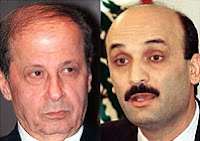 It's election season in Lebanon, and what normal democracies expect from their politicians at a time like this is statements about their political platforms. We should expect to hear what they will do to make our lives better.
It's election season in Lebanon, and what normal democracies expect from their politicians at a time like this is statements about their political platforms. We should expect to hear what they will do to make our lives better.But in Lebanon these elusive platforms are all but missing from the political debate. And with our multi-party cabinet taking almost all its decisions unanimously, it is hard to see why we should vote for one party over another. Yesterday was the first time we saw a real disagreement in the cabinet over appointing the head of the election campaign supervisory committee. Al-Nahar reported that the opposition used its veto for the first time. (By the way this is simply not true. The question at hand was not one that opposition were allowed to veto: their veto only applies to decisions on "basic national matters," and the real reason the opposition's opposition influenced the final decision was that President Suleiman did not call for a vote until the opposition was satisfied (way to be neutral Mr. President)).
In any case, currently the choice of head for the election campaign supervisory committee is all we really have to go by when choosing who to vote for this year... Well, that and how much they like Syria. In fact, the Syria factor seems to be the core of the election campaign on both sides. With Jumblatt essentially telling us to vote for him or Ghazi Kanaan will come and eat our children at night, and Aoun going around telling us to vote for him so he can make love to Bashar Al-Asad more effectively, I wonder how the average non-affiliated Lebanese will be able to make a decision (if such a person exists at all).
But it's not completely hopeless, every once in a while we do hear some concrete ideas. Michel Aoun recently proposed a national defense strategy whereby resistance elements will be placed in villages and towns all over Lebanon creating something of a national militia, similar to Hezbollah's method, but nation-wide. I frankly think this is a terrible idea simply because I don't trust the Lebanese with weapon caches in their villages.
And just yesterday Aoun's arch-nemesis Geagea also teased us with a vague reference to his own national defense strategy that he intends to present at the next dialogue meeting. He makes an obscure reference to some strategy based on historic precedent namely, the case of Switzerland during World War II and how it managed to avoid attack. Great! Now as soon as Geagea clears his strategy up we will have two solutions to the same problem and we can vote based on whichever of these makes more sense to us...
Right?... Not exactly. From what I understand, the Swiss defense strategy is one of a nation-wide militia with every male citizen between the ages of 19 and 31 keeping a military rifle in their homes, ready to mobilize at a moment's notice. So is this what Geagea is gonna propose? (It's either that or that Lebanon should keep making economic concessions to our enemies and allow our banks to store Nazi gold, which is the only other reason why Switzerland wasn't attacked during the war.) But if this IS what he will propose, to me it sounds painfully similar to Aoun's proposal of a nation-wide Hezbollah-style defense militia.
So even on the most divisive issue, these two arch-enemies seem unable to present significantly different proposals to allow for decent electoral decision making. The only thing more depressing than that is that even with such similar initial proposals, the two sides will probably never agree.
So where does that leave us? Well it leaves us with an easy approach to decide who to vote for: grab the nearest picture of Bashar Al-Assad you can find, stare at it for a moment, if you suddenly feel afraid, angry, nauseous or generally uneasy, then you're better off voting for March 14, otherwise you might find it more suitable to vote for the Tayyar-Hezbollah group.










 "Enough Injustice," reads the poster this woman is carrying during a protest earlier this week demanding the release of alleged islamist fighters who were detained by the army last summer during the Nahr El-Bared crisis.
"Enough Injustice," reads the poster this woman is carrying during a protest earlier this week demanding the release of alleged islamist fighters who were detained by the army last summer during the Nahr El-Bared crisis.












